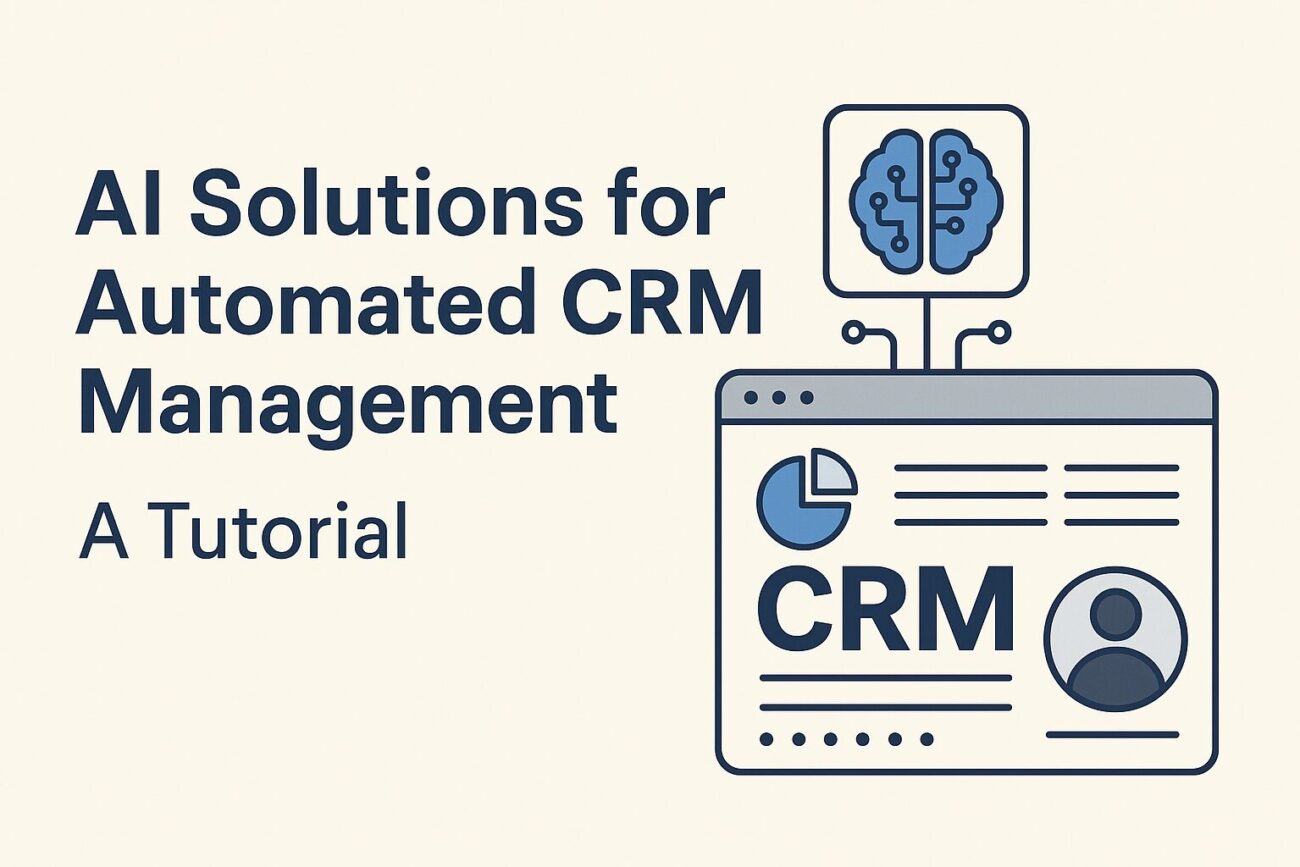Introduction
Customer Relationship Management (CRM) is a critical aspect of business growth, but manual data handling can be time-consuming and prone to errors. AI-powered CRM solutions optimize customer interactions, automate workflows, and improve sales forecasting, ensuring efficient data management and smarter customer engagement.
This tutorial provides a step-by-step guide to implementing AI in CRM, structured with SEO-friendly formatting to enhance visibility and search rankings.
1. Why AI is Transforming CRM Management
Traditional CRM systems require manual data entry, segmentation, and reporting, limiting productivity. AI enhances CRM automation by analyzing customer interactions, predicting behaviors, and optimizing engagement strategies.
Key Benefits of AI-Powered CRM Solutions
- Automated Data Entry & Contact Management – AI updates and maintains customer records without manual input.
- Predictive Analytics for Customer Insights – AI forecasts trends based on customer interactions.
- AI-Powered Sales & Lead Scoring – AI prioritizes leads based on likelihood of conversion.
- Chatbot & AI-Assisted Customer Support – AI provides instant responses and automated assistance.
- Personalized Marketing Recommendations – AI segments customer data for targeted campaigns.
AI-driven CRM tools reduce human errors, optimize sales strategies, and enhance customer satisfaction.
2. Core AI Technologies for CRM Automation
AI-powered CRM systems use machine learning, natural language processing (NLP), and automation to streamline customer interactions.
Essential AI Technologies in CRM Management
- Natural Language Processing (NLP) for Chatbots – AI understands customer queries and responds intelligently.
- Machine Learning for Predictive Analytics – AI refines customer segmentation and behavior forecasting.
- AI-Powered Recommendation Engines – AI personalizes email marketing, offers, and follow-up strategies.
- Automated Workflow Management – AI simplifies repetitive tasks, improving operational efficiency.
- Sentiment Analysis for Customer Feedback – AI analyzes tone in messages to detect satisfaction levels.
These technologies enhance data organization, customer communication, and overall CRM efficiency.
3. Step-by-Step Guide to Developing AI-Powered CRM Tools
Creating an AI-driven CRM system requires structured planning and integration with existing platforms.
Steps for AI CRM Development
- Define CRM Automation Goals – Identify whether AI will streamline sales processes, automate responses, or enhance data analytics.
- Collect & Organize Customer Data – AI requires structured data sets from email interactions, purchase history, and CRM logs.
- Develop AI-Powered Customer Insights Models – AI must analyze behavior patterns to suggest personalized actions.
- Integrate AI with CRM Software & Business Tools – AI should sync with platforms like Salesforce, HubSpot, or Zoho.
- Enable AI-Powered Customer Engagement Features – AI must optimize follow-ups, automated responses, and marketing outreach.
- Refine & Optimize AI for Accuracy – Continuous learning ensures AI adapts to customer behavior trends.
These steps help businesses implement AI-driven CRM solutions seamlessly.
4. SEO Optimization for AI CRM Solutions
SEO ensures AI-powered CRM platforms rank higher in search engines and attract relevant audiences.
Best SEO Strategies for AI CRM Systems
- Keyword Optimization – Use terms like “AI CRM automation,” “predictive analytics for CRM,” and “smart customer engagement.”
- Data-Driven Case Studies & Reports – Publish insights showcasing AI-powered CRM improvements.
- Mobile-Friendly CRM Interfaces – Ensure AI CRM solutions work seamlessly across devices.
- Industry Collaborations & Expert Input – Partner with business leaders and CRM specialists for credibility.
- Optimized Metadata & Page Structure – Improve rankings using structured content and targeted descriptions.
SEO-focused strategies enhance CRM tool adoption and search visibility.
5. Enhancing AI CRM Solutions for Long-Term Success
AI-powered CRM platforms require ongoing optimization to remain effective.
Metrics for AI CRM Optimization
- Customer Interaction & Engagement Tracking – AI must analyze communication patterns for better engagement.
- Lead Conversion & Sales Forecast Accuracy – AI should refine predictions for improved sales outcomes.
- User Feedback Integration & AI Adaptability – AI must adjust responses and recommendations based on customer sentiment.
- Security & Compliance Measures – AI CRM systems must follow industry regulations for data protection.
- Cross-Platform Integration & Scalability – AI tools should seamlessly integrate with various business applications.
Regular enhancements ensure AI-driven CRM solutions remain competitive and reliable.
Conclusion
AI-powered CRM management tools automate customer interactions, optimize sales processes, and enhance data-driven decision-making. By integrating machine learning, NLP, and predictive analytics, businesses can streamline operations, improve engagement, and increase revenue.

